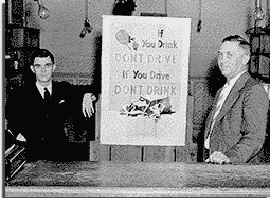Pitt County ABC Board
In The North Carolina ABC System, there are about 430 stores serving 168 Municipal and County Entities overseen by the governing authority (city council or county commissioners). Our five-member board constantly seeks ways to make our system more responsible by abiding by and enforcing ABC Laws and Regulations; more profitable by using successful business practices; and more progressive by studying and employing new methods of providing for the needs and desires of the consumer. Pitt County provides over $18 million in retail sales through its 8 outlets situated in easily accessible locations throughout the county. Pitt County opened its first store on July 27, 1935.
Brief History of ABC Boards
In 1937, an Alcoholic Beverage Control bill was enacted by the North Carolina General Assembly that created the foundation for the system of control we operate under today. This Act allowed voters in each county to determine whether or not spirituous liquor should be sold at retail. If approved by the local voters, the Act provided for the establishment of a local ABC board that has the authority and duty to operate one retail ABC store. If disapproved at the county level, local towns or municipalities could then vote on the issue. The Act also provided for the establishment of a State ABC Commission to have oversight authority with respect to each local ABC Board.
Today, there are 168 local ABC systems in the State that operate 430 retail stores. Fiscal year ending June 30, 2017, the retail and mixed beverage sales totaled approximately $1.068 billion. County and municipal ABC Boards in North Carolina are local independent political subdivisions of the State. They operate as separate entities establishing their own policies and procedures.
Each local ABC Board consists of a Chairman and two to six (depending on the Board size) board members appointed by their city, town or county governing authority. They retain authority to set policy and adopt rules in conformity with ABC Laws and Commission Rules.

State Warehouse
Spirituous liquors that are approved for sale in the State of North Carolina are transported to and stored in a state-owned warehouse in Raleigh. The administrative oversight of the State Warehouse is the responsibility of the North Carolina Alcoholic Beverage Control Commission. The Commission contracts with a privately owned warehouse contractor, currently, LB&B Associates, which is responsible for the receipt, storage and distribution of spirituous liquor throughout the State. The Warehouse operates under a bailment system in which the ownership of the product remains with the distillery until it is delivered to the local ABC Boards. The purchaser of spirituous liquor pays the contractor’s fees indirectly. The fee, called the "bailment charge ," (currently $1.60 per case) is added to the price of liquor to pay for the warehousing and delivery of the liquor to the local boards.
The State Warehouse laws are described in the North Carolina General Statutes, Chapter 18B. (18B-204.)

